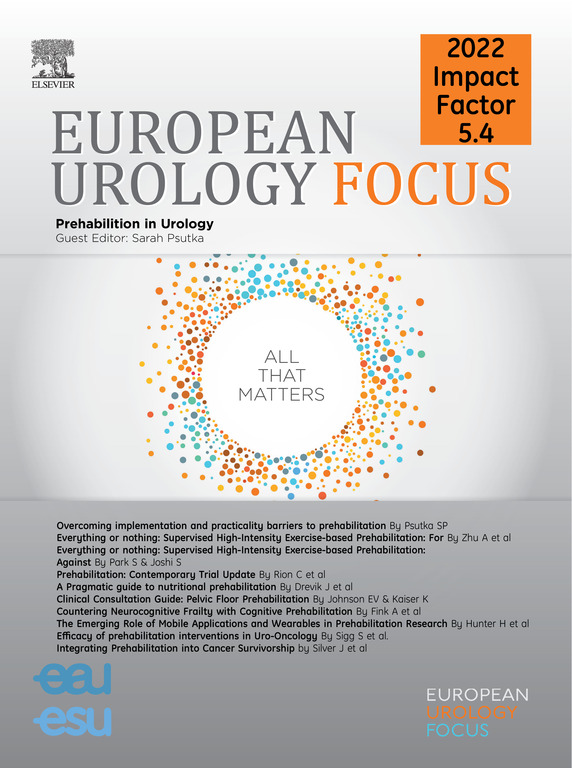受者体重指数对肾移植结果的影响:法国泌尿外科协会移植委员会的系统回顾和荟萃分析。
IF 4.8
2区 医学
Q1 UROLOGY & NEPHROLOGY
引用次数: 0
摘要
背景:受体肥胖对肾移植(KT)结果的影响尚不清楚。目的:本研究的目的是进行系统回顾和荟萃分析,以评估肥胖患者(体重指数[BMI]≥30 kg/m2)与非肥胖患者(BMI 2)的KT结局的所有现有证据。证据获取:进行系统回顾和荟萃分析。在MEDLINE OvidSP、Web of Science、Google Scholar、Embase和Cochrane数据库中进行搜索,以确定所有报告肥胖与非肥胖受体之间KT结果的研究。证据综合:52篇文章符合纳入标准。肥胖受体延迟移植功能和手术并发症明显高于肥胖受体(延迟移植功能:相对风险[RR]: 1.44, 95%可信区间[CI]: 1.32-1.57, p)。结论:肥胖受体的KT与较低的患者和移植物存活率、较高的延迟移植功能、急性排斥反应和医疗和手术并发症相关。在目前器官短缺和肥胖日益流行的情况下,应该研究如何优化这种情况下的KT。患者总结:与非肥胖人群相比,肥胖受者的肾移植患者和移植物存活率较低,且医疗和手术并发症较高。本文章由计算机程序翻译,如有差异,请以英文原文为准。
Effect of Recipient Body Mass Index on Kidney Transplantation Outcomes: A Systematic Review and Meta-analysis by the Transplant Committee from the French Association of Urology
Context
The impact of recipient obesity on kidney transplantation (KT) outcomes remains unclear.
Objective
The aim of this study was to perform a systematic review and meta-analysis to appraise all available evidence on the outcomes of KT in obese patients (body mass index [BMI] ≥30 kg/m2) versus nonobese patients (BMI <30 kg/m2).
Evidence acquisition
A systematic review and meta-analysis was performed. Search was conducted in the MEDLINE OvidSP, Web of Science, Google Scholar, Embase, and Cochrane databases to identify all studies reporting the outcomes of KT in obese versus nonobese recipients.
Evidence synthesis
Fifty-two articles met the inclusion criteria. Delayed graft function and surgical complications were significantly higher in obese recipients (delayed graft function: relative risk [RR]: 1.44, 95% confidence interval [CI]: 1.32–1.57, p < 0.01; surgical complications: RR: 1.74, 95% CI: 1.36–2.22, p < 0.0001). Five-year patient survival (RR: 0.96, 95% CI: 0.92–1.00, p = 0.01), 10-yr patient survival (RR: 0.90, 95% CI: 0.84–0.97, p = 0.006), and 10-yr graft survival (RR: 0.87, 95% CI: 0.79–0.96, p = 0.01) were significantly inferior in the obese group.
Conclusions
KT in obese recipients was associated with lower patient and graft survival, and higher delayed graft function, acute rejection, and medical and surgical complications than nonobese recipients. In the current situation of organ shortage and increasing prevalence of obesity, ways to optimize KT in this setting should be investigated.
Patient summary
Compared with nonobese population, kidney transplantation in obese recipients has inferior patient and graft survival, and higher medical and surgical complications.
求助全文
通过发布文献求助,成功后即可免费获取论文全文。
去求助
来源期刊

European urology focus
Medicine-Urology
CiteScore
10.40
自引率
3.70%
发文量
274
审稿时长
23 days
期刊介绍:
European Urology Focus is a new sister journal to European Urology and an official publication of the European Association of Urology (EAU).
EU Focus will publish original articles, opinion piece editorials and topical reviews on a wide range of urological issues such as oncology, functional urology, reconstructive urology, laparoscopy, robotic surgery, endourology, female urology, andrology, paediatric urology and sexual medicine. The editorial team welcome basic and translational research articles in the field of urological diseases. Authors may be solicited by the Editor directly. All submitted manuscripts will be peer-reviewed by a panel of experts before being considered for publication.
 求助内容:
求助内容: 应助结果提醒方式:
应助结果提醒方式:


